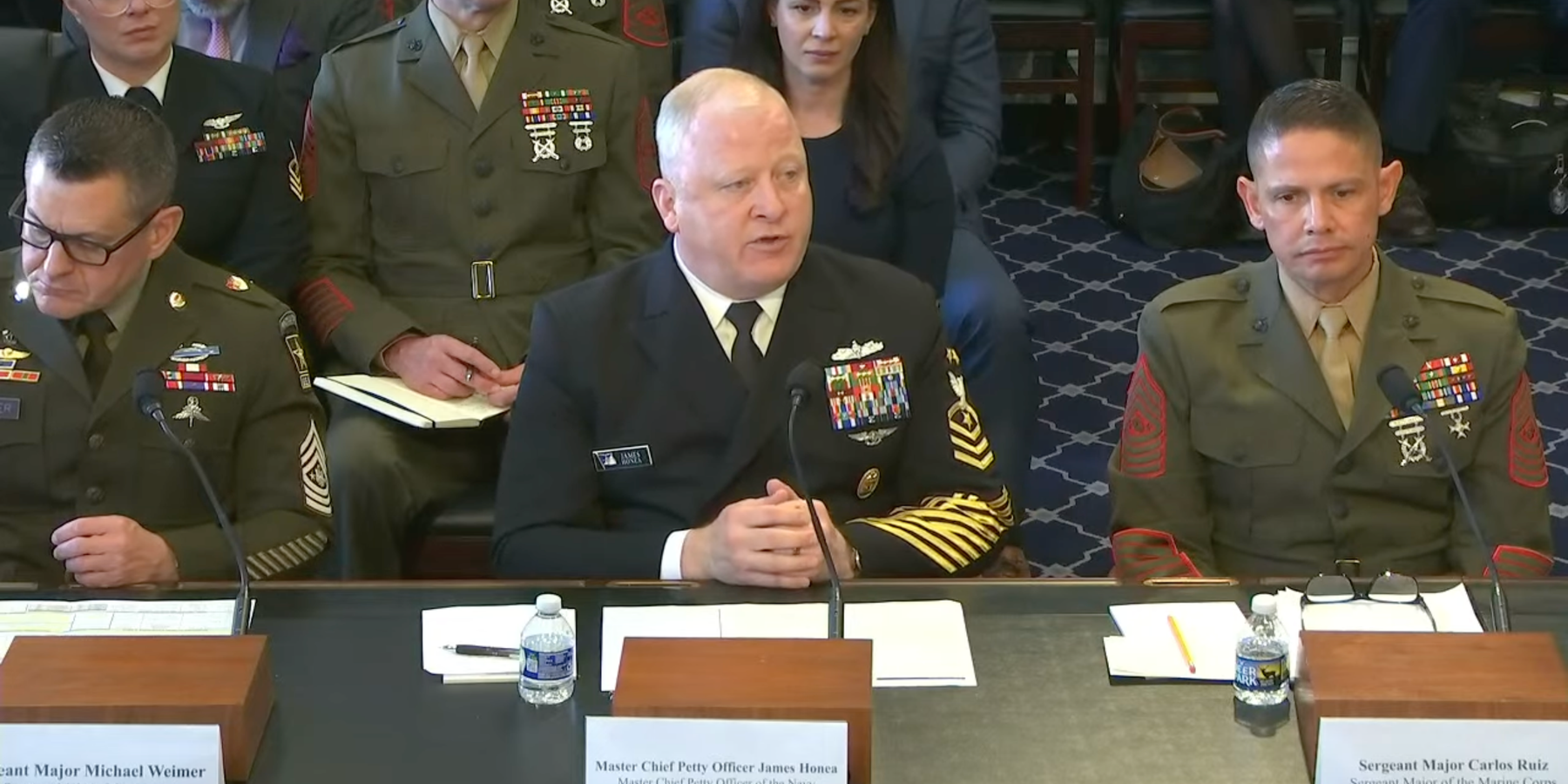U.S. soldiers face a quality-of-living crisis as the Pentagon’s recruitment woes persist, according to top-ranking enlisted officers from across the U.S. military.
“We’ve had a break in trust with our American people,” said Master Chief James Honea, the top enlisted adviser to Navy leadership, in a Wednesday congressional hearing. “We have to do much better at taking care” of our service members, Honea said, adding that he doesn’t want the military to “reach a breaking point” where more people decide to leave the military.
Officers and members of Congress highlighted poorly maintained barracks, food insecurity, sexual violence, and limited access to healthcare and childcare as key problems facing U.S. soldiers today. Economic problems are particularly acute among military families, who often struggle to find jobs for civilian spouses and proper food and healthcare for their children.
“It's time for our actions to match up with our words, as far as putting families above everything else,” said Rep. Tony Gonzales (R-Texas).
The hearing gives insight into why the military is struggling to recruit soldiers even as Pentagon bigwigs prepare for a potential war with China in the coming years. According to a newly released Blue Star Families survey, only 32% of active-duty military families would recommend service to others — a 23-point drop since 2016.
While the reasons for this are diverse, a few numbers stand out. One in six active-duty military families reported food insecurity in 2023, and that jumps up to one in four among the families of enlisted soldiers. Military families also reported longer wait times for accessing healthcare than their civilian counterparts, and 8% of active-duty soldiers said they “seriously considered suicide in the past year,” as compared to 5% among U.S. adults as a whole, according to the Blue Star Families survey.
Housing is another problematic area for recruitment and retention. Despite record-high military spending, some enlisted soldiers are living in poorly maintained barracks that have mold, brown tap water, and serious safety issues, according to a recent report by the Government Accountability Office. The report, which also noted a $137 billion backlog of barracks maintenance costs, sparked condemnation from members of Congress.
“This is unacceptable,” tweeted Rep. Sara Jacobs (D-Calif.). “Our service members & their families already sacrifice so much to keep us safe and the least we can do is ensure they have quality housing.”
The problems with barracks are “not defendable,” said Sergeant Major Carlos Ruiz, the Marine Corps’ top enlisted officer. The Marine Corps is working to add air conditioning to all bases in hotter climates, Ruiz told Congress, adding that the service has refurbished 30 barracks in the past five years. Leaders from across the military said they hope to bring on full-time managers and repair crews to get living facilities back into shape.
Notably, the Biden administration’s proposed budget for next year contains funding to help remedy some quality-of-life issues, including expanded food assistance programs, suicide and sexual assault prevention efforts, and a 4.5% raise for soldiers. But the request falls short when it comes to funding for refurbishing barracks and improving facilities on bases.
Given the gap in funding, the Marine Corps has gone around the White House to request an additional $642 million from Congress for barracks restoration and other “quality of life” improvements for service members. This request came through the controversial but congressionally mandated “wish list” policy, under which all services and combatant commands must tell lawmakers which goodies they want on top of the president’s budget.
Watchdogs have long argued that these wish lists are a backdoor way to force Congress to boost the Pentagon’s total funding. “Far too often, they'll put lower priority things in the base budget, and then put higher priority items in the unfunded priorities list saying, ‘hey, we really need this,’” Dan Grazier of the Project on Government Oversight told RS last year.
But this game of hide-the-ball may be more complicated this time around given that next year’s spending will be constrained by budgetary caps imposed as part of a 2023 deal to lift the debt ceiling. President Joe Biden’s military budget request is tailored to fit within its $895 billion cap for next year, leaving little room for funding other proposals.
Officers lamented that so-called urgent needs — like funding for expanded military operations in the Middle East to contain the Gaza war — tend to beat out requests for quality-of-life improvements for front-line service members. “I don't think these things should be in competition with one another,” said Honea.
- In our lurch toward war in three places, who exactly will fight? ›
- Why America fell out of love with its Army ›
- Fort Bragg horrors expose dark underbelly of post-9/11 warfare | Responsible Statecraft ›
















